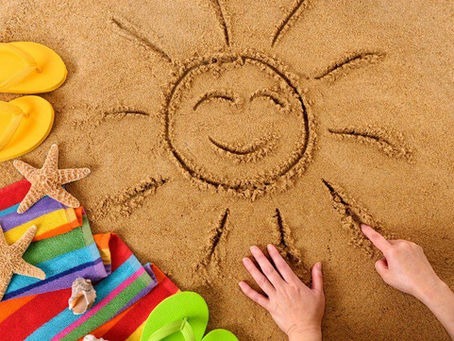
As the hot summer season approaches, your family is eagerly preparing for outdoor adventures, pool parties, and, of course, the much-anticipated Fourth of July celebrations. As a pediatrician, I want to ensure that this summer is not only filled with fun and excitement but also with safety and well-being. In this post, I will share some valuable recommendations to help you navigate the summer months and the Fourth of July holiday while keeping your children safe.
1. Sun Safety:
Sunshine and outdoor activities go hand in hand during the summer, but it's essential to protect your child's delicate skin from harmful UV rays. Here are some sun safety tips:
a) Apply sunscreen: Choose a broad-spectrum sunscreen with an SPF of at least 30, 50 for infants. Apply it generously to all exposed skin, including the face, ears, neck, and arms. Reapply every two hours, or more frequently if your child is swimming or sweating. b) Seek shade: Encourage your children to take breaks in shaded areas, especially during peak sun hours between 10 a.m. and 4 p.m. c) Dress for protection: Dress your child in lightweight, light-colored clothing that covers their arms and legs. Additionally, wide-brimmed hats and sunglasses with UV protection can help shield their face and eyes. I've seen children get sunburned through light layers of clothing, so avoid the sun, if you can, or wear UV protectant clothing.
2. Water Safety:
Pools, beaches, and water parks are popular summer destinations. To ensure water safety, consider the following:
a) Constant supervision: Always closely supervise your child when they are near or in water. It only takes a few seconds for an accident to occur, so stay within arm's reach and remain vigilant. Drownings are most often silent. b) Swim lessons: Enrolling your child in age-appropriate swim lessons can provide them with valuable water safety skills and boost their confidence in the water. c) Life jackets: When boating or participating in water sports, make sure your child wears a properly fitted U.S. Coast Guard-approved life jacket. This applies to children of all ages and abilities.
3. Fireworks Safety:
The Fourth of July wouldn't be complete without fireworks. However, it's crucial to handle them responsibly to prevent injuries. It is my opinion that children should not handle any fireworks. Keep these tips in mind: a) Attend professional displays: Instead of hosting your fireworks, consider attending a public fireworks show organized by trained professionals. These displays provide a spectacular experience while minimizing the risk of accidents. b) Safety distance: If you choose to use fireworks at home, ensure a safe distance from buildings, trees, and dry vegetation (this has been an extremely dry year so please consider all vegetation dry) . Follow all instructions and recommendations provided by the manufacturer. c) Adult supervision: Never allow children to handle fireworks. Even seemingly harmless fireworks, such as sparklers, can cause severe burns. It happened to me as a child and i've seen it happen to many others.
4. Insect Protection:
Warmer weather brings out various insects, including mosquitoes and ticks. Protect your child from bug bites with these measures: a) Apply insect repellent: Use an insect repellent that is specifically formulated for children and contains DEET, picaridin, or IR3535. Apply it to exposed skin, but avoid the eyes, mouth, and hands. If you're like me, I try to avoid all chemicals possible. Most essential oil companies have a natural insect repellent. We use Lemon Eucalyptus oil for our children. b) Protective clothing: Dress your child in long-sleeved shirts, long pants, and socks when venturing into wooded or grassy areas where ticks are prevalent. c) Check for ticks: After spending time outdoors, thoroughly check your child's body for ticks. Pay close attention to the scalp, behind the ears, and under the arms. d) Mosquito nets work great for infants. They make them with elastic so you can put them over carseats and strollers.
5. Heat
a) All children handle the heat differently. My mottos is 'baby is the boss'. If you know your baby is fed and changed, but is fussy, its likely time to get in from the heat. I always see babies at Cardinals game, no matter how hot it is. And i always see parents trying to soothe those fussy babies. The bottom line is, the babies don't care if it's their first Cardinals game. They are hot and need to get inside to cool off. b) Infants don't need extra water since most of what they eat is liquid. Children over 1 should get extra water/electrolyte solution when hot.
6. Noise
As the summer season beckons with its vibrant outdoor activities, it's essential to remember that protecting our children's hearing is just as crucial as safeguarding their skin from the sun. From noisy fireworks to bustling water parks, summer activities can expose children to potential hearing damage. As a pediatrician, I want to emphasize the importance of summer hearing protection for our little ones.
a) Earplugs: Consider investing in high-quality, child-sized earplugs. These are available at most drugstores and are specifically designed to reduce noise levels while maintaining comfort. Earplugs can be particularly beneficial during events such as firework displays or concerts, where loud noises are expected.
b) Earmuffs: Earmuffs are an excellent option for younger children or those who may have difficulty with earplugs. Look for earmuffs designed for children, as they provide appropriate noise reduction without causing discomfort.
I hope you all have a fun and safe summer!
Dr. Joe





